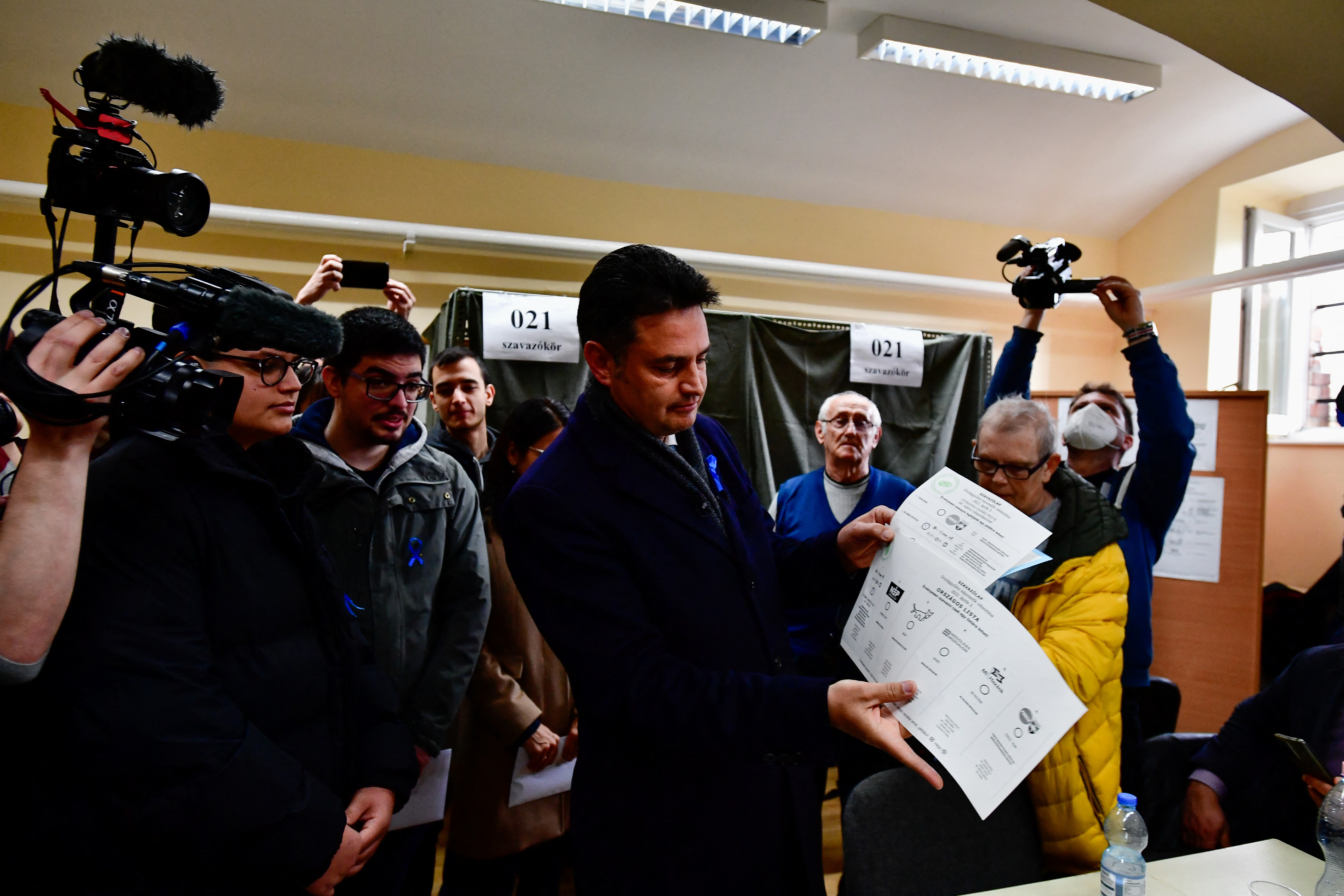
To confront it, an unprecedented and very disparate alliance of six parties has been formed determined to turn over the “authoritarian” 58-year-old leader.
Accused by the European Commission of multiple attacks on the rule of law, Orban has silenced justice and media for three consecutive terms, while promoting an ultra-conservative vision of society.
Dressed in black and with a serious face, Orban voted with his wife Aniko Levai early in the morning at a school in the suburbs of Budapest, and promised a “great victory”.
“It is a fair and fair election,” he said, rejecting accusations of fraud in elections that for the first time are being watched by more than 200 international observers. Each side has also deployed many volunteers.
The leader of the opposition, Peter Marki-Zay, 49, voted with his seven children after attending mass in his hometown of Hodmezovasarhely (southeast).
Marki-Zay, nicknamed MZP, denounced the “unfair and impossible conditions” aimed at allowing his rival to “remain in power forever”, citing for example that he has barely been entitled to five minutes on public television, which like other official media has folded to Orban.
At half-time (11H00 GMT), the participation rate stood at 40%, slightly lower than that of the record mobilization of the 2018 elections.

“They ruined the country”
Among the supporters of Fidesz, the ruling party, Zsuzsa Alanyi, a 44-year-old decorator mother of four, highlighted “tax cuts” and “aid” to families.
On the contrary, for Agnes Kunyik, 56, Orban and his party “ruined our country, destroyed it”. “We want to stay in Europe, we want a democratic state with rational leaders,” he told AFP.
The election will not be defined in the capital Budapest, where the victory of the opposition seems guaranteed, but in some 20 to 30 undecided constituencies, out of the 199 seats of Parliament.
MZP toured these territories in recent weeks to listen to their fellow citizens, take selfies and sign autographs, hoping to defeat the government's “propaganda”.
On the contrary, “Viktor Orban was invisible or almost on the ground,” stresses Andras Pulai, from the opposition's nearby Publicus public polling institute. “He essentially participated in events reserved for his most loyal supporters,” Pulai told AFP.
The latest Publicus poll shows the two forces equal, while other pollsters give Fidesz a slight advantage.
As a result of the electoral system, the opposition should “win by 3 or 4 points” to obtain a majority in Parliament, according to Pulai. “It is very difficult to predict the outcome of the count. Anything can happen,” this expert estimates.
Especially that the conflict in neighboring Ukraine brutally changed the situation. “War broke out and war changed everything,” Orban summed up Friday at his only campaign rally. “Peace against war”, the equation is simple to understand.
On the one hand, a government that refuses to hand over arms to Ukraine and vote on sanctions that would deprive Hungary of precious Russian oil and gas. On the other, an opposition that would be bellicose.
Despite insisting with this speech, the closeness cultivated since 2010 with the “aggressor” Vladimir Putin could turn against him, emphasizes Pulai.
In addition to the election of deputies, Hungarians are called upon to answer four questions related to the recent anti-LGBT+ law, which prohibits talking at least 18 years of age about “sex change and homosexuality”.
The polling stations opened at 06H00 (04H00 GMT) and close at 19:00. But the results would only be known at midnight, the government spokesman said Saturday.
KEEP READING:
Últimas Noticias
Debanhi Escobar: they secured the motel where she was found lifeless in a cistern
Members of the Specialized Prosecutor's Office in Nuevo León secured the Nueva Castilla Motel as part of the investigations into the case

The oldest person in the world died at the age of 119
Kane Tanaka lived in Japan. She was born six months earlier than George Orwell, the same year that the Wright brothers first flew, and Marie Curie became the first woman to win a Nobel Prize

Macabre find in CDMX: they left a body bagged and tied in a taxi
The body was left in the back seats of the car. It was covered with black bags and tied with industrial tape
The eagles of America will face Manchester City in a duel of legends. Here are the details
The top Mexican football champion will play a match with Pep Guardiola's squad in the Lone Star Cup

Why is it good to bring dogs out to know the world when they are puppies
A so-called protection against the spread of diseases threatens the integral development of dogs



